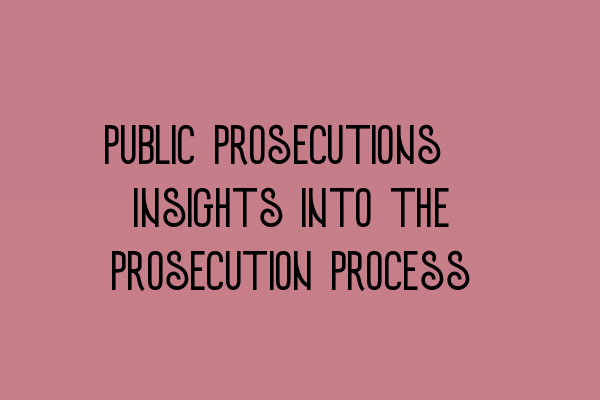Public Prosecutions: Insights into the Prosecution Process
As criminal law solicitors at SQE Criminal Law & Practice Law UK, we have extensive experience in navigating the intricate world of public prosecutions. In this blog post, we will provide you with valuable insights into the prosecution process, shedding light on its various aspects and the crucial role it plays in upholding justice.
What is the Prosecution Process?
The prosecution process refers to the sequence of events that occur from the initial charging of an accused person to their trial in court. It is essentially the process through which the state or government brings charges against an individual for an alleged criminal offense.
Key Players and Phases of the Prosecution Process
The prosecution process involves several key players who work together to ensure a fair and robust legal system. Let’s take a closer look at the main phases and the individuals involved:
1. Investigation
The investigation phase marks the initial stage of the prosecution process. Law enforcement agencies, such as the police, gather evidence, interview witnesses, and compile the necessary information to build a case against the accused.
Related Article: SQE 1 Practice Exam Questions
2. Charging Decision
Following the investigation, the prosecuting authority, which is typically the Crown Prosecution Service (CPS) in the UK, reviews the evidence gathered. They assess whether there is sufficient evidence to proceed with the charges and make a charging decision. This decision is based on the principles of fairness, public interest, and the likelihood of conviction.
3. Pre-Trial Management
Once the accused is charged, the case moves into the pre-trial management phase. During this phase, the prosecution and defense exchange information and documents, identify any legal issues, and prepare for trial. This stage is crucial in ensuring a smooth trial process.
Related Article: SQE 1 Practice Mocks FLK1 FLK2
4. Trial
The trial is the most prominent phase of the prosecution process. It takes place in a court of law, where the prosecution presents its case and the defense mounts a legal defense on behalf of the accused. The judge or jury evaluates the evidence and makes a determination on the guilt or innocence of the accused.
5. Sentencing
If the accused is found guilty, the court proceeds to the sentencing phase. The judge considers various factors such as the severity of the offense, the circumstances of the case, and any aggravating or mitigating factors. They then hand down an appropriate sentence within the legal framework.
6. Appeals
In some cases, either the prosecution or the defense may choose to appeal the verdict or the sentence. Appeals are heard by higher courts, where the decision is reviewed for errors or legal issues. The appeals process ensures that justice is maintained and provides an opportunity to correct any miscarriage of justice.
The Importance of the Prosecution Process
The prosecution process is crucial for maintaining law and order within society. It serves as a deterrent to potential offenders, as the consequences of their actions are thoroughly examined and addressed. Moreover, it ensures that the rights of both the accused and the victims are protected, guaranteeing a fair and impartial trial.
Conclusion
As criminal law solicitors, we understand the intricacies and importance of the prosecution process. From the initial investigation to the final verdict, every phase plays a pivotal role in upholding justice. If you find yourself in need of legal assistance or have any questions regarding the prosecution process, do not hesitate to reach out to us at SQE Criminal Law & Practice Law UK.
Related Articles:
